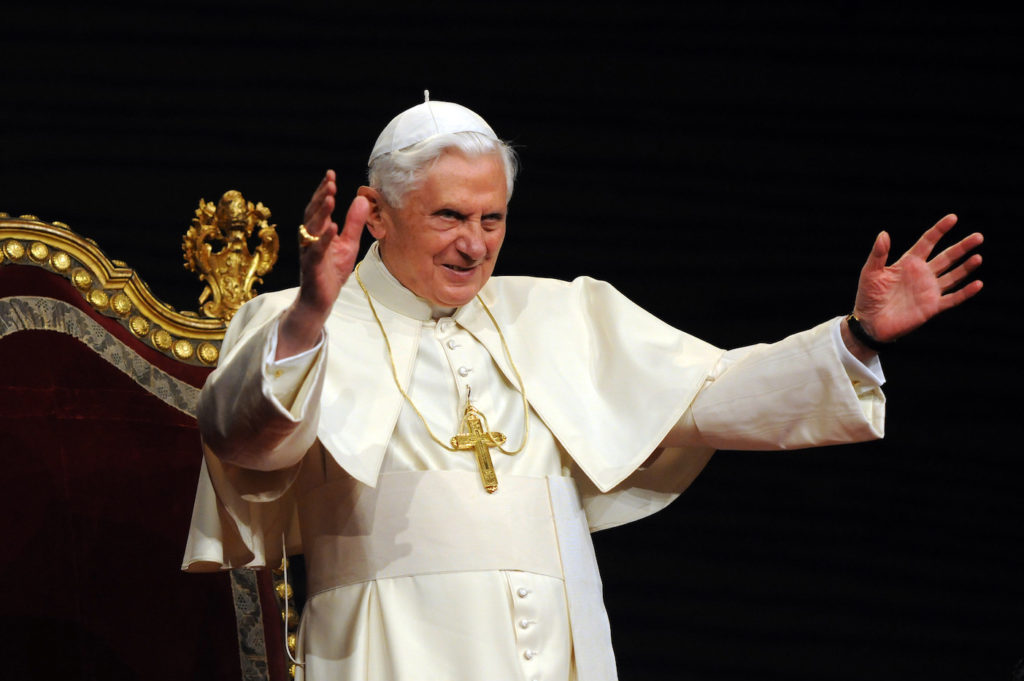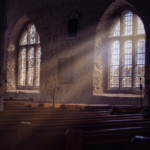It is customary in late December for newspapers to list famous individuals who died that year, skewing to entertainers, celebrities, and politicians. Some years seem more momentous than others, as if an era has disappeared, although that sense likely depends on one’s own age and background. The passing of Queen Elizabeth and Benedict XVI strikes me as significant, however, and not simply because I grew up with her image on coins or decided to enter the Catholic Church during his pontificate. I cannot shake the idea that with their deaths we lose a link to something before. I’m not sure I can answer the obvious question—“before what?”—without nostalgia or over-simplification, but I mean something like the time when faith was the inner form of Europe.
I know that’s not quite true, of course. That form of Europe died in World War I, if not earlier, and both Elizabeth and Ratzinger came of age during World War II and its horrors, but Elizabeth represented the dutifulness of an older world and Ratzinger was convinced that Europe had entered a time after, a post-Christian time, a time adrift from its roots. Consequently, Benedict, while himself a man of hope, knew that as the West lost faith it also lost hope, forgot hope, and struggled even to recognize it as a virtue.
The contemporary West styles itself as having left superstition and faith behind while embracing maturity, science, and rationality, but in reality it has bestowed on itself a sclerotic, narrow, instrumentalized reason, a reason desperately in need of being enlarged, expanded to its full range.
Ratzinger proclaimed the correspondence of faith and reason. Truth cannot contradict truth, and reasonable faith and faithful reason are natural allies. It is contrary to the nature of God to be, do, or proclaim anything in violation of reason, Ratzinger taught, and the natural order was itself preserved and sustained by the same God proclaimed by revelation and the Church. Faith perfected reason but did not supplant or contradict it. The person of faith was also a person of reason, but the loss of faith turned out—counter-intuitively for some—to prompt the loss of reason also. The contemporary West styles itself as having left superstition and faith behind while embracing maturity, science, and rationality, but in reality it has bestowed on itself a sclerotic, narrow, instrumentalized reason, a reason desperately in need of being enlarged, expanded to its full range. To ignore or refuse the genuine knowledge provided by religion, he suggested, is “an unacceptable restriction of our listening and responding,” and a central task of the faithful was providing nonbelievers “the courage to engage the whole breadth of reason, and not the denial of its grandeur.” Benedict, to my mind at least, was a man who breathed the intellectual air of the time before, that is, a time before Europe and the West suffocated reason in the name of rationality. The contemporary mind is small, sacrificing its range for efficiency and precision. So, too, contemporary man has become small, viewing himself more like machine than imago Dei.
Start your day with Public Discourse
Sign up and get our daily essays sent straight to your inbox.Consequently, Benedict was sometimes viewed as pessimistic compared to the daring optimism of his predecessor, more Augustinian about the human condition. And well known are his claims that the Church would become smaller, that we suffered under the dictatorship of relativism, and, perhaps most telling, that nature itself had become a blunt instrument. If nature was blunt, how blunt, and what then of the Thomistic confidence about natural law, natural theology, and the ultimate unity of faith and reason?
The contemporary mind is small, sacrificing its range for efficiency and precision. So, too, contemporary man has become small, viewing himself more like machine than imago Dei.
I do not view him as a pessimist, but rather as an apostle proclaiming the Christian message in the way needed in his time and place, namely, the West at the turn of the millennium. Benedict had particular concern and focus—perhaps too much, some might suggest—on Europe and the loss of faith, hope, and reason in that continent, for he knew that a Europe forgetful of its sources and origins was dying in slow motion of sadness, despair, and the false promises of technocracy. Europe emerged from the faith, Western reason emerged from the faith, and the dynamism and liveliness that have defined Europe for ages emerged from the faith; as the faith withered, so too reason, dynamism, liveliness, and identity. In so many ways, our disenchanted age is unbearably sad, but sadness is entirely alien to the Christian spirit.
Some who (bizarrely) viewed Ratzinger as “God’s Rottweiler” proclaimed their surprise at the topics of his encyclicals, namely, love and hope, but those who had read and understood him were not surprised. This was a man whose dying words, it is reported, were “Jesus, ich liebe dich” (“Jesus, I love you”), a man whose entire life was shaped by his love of God and a message of God’s love for us. From that love, Benedict proclaimed hope, the antidote to sadness. In his 2007 encyclical, Spe salvi, he began by reminding us that “we have been given hope, trustworthy hope, by virtue of which we can face our present.”
Hope has a particular and definite shape, he insisted, an encounter with God that gave faith. Citing Paul, Benedict suggested many had overlooked the Pauline link between faith and hope and thus the very meaning of hope. To stress this, he left untranslated a central term: “Faith is the hypostasis of things hoped for; the proof of things not seen.” Modern versions tend to translate the Pauline text as “faith is standing firm in what one hopes, being convinced of what one does not see,” but this turns faith (and thus hope) into a subjective disposition, a personality trait, or a kind of epistemological “conviction” that could come and go and that was rooted primarily in the self. Instead, Benedict explained that faith “gives us something. It gives us even now something of the reality we are waiting for, and this present reality constitutes for us a ‘proof’ of the things that are still unseen.” Hypostasis should be translated as substance, as reality, a reality already present, already known, already objective. That is, faith gives us God’s own life, infused into our soul by virtue of baptism, according to the Catholic understanding, and one has hope because one has God. Not belief about God, not belief in God, not convictions about God—one has God, and God is the substance of hope. It is, he insists, “not only a reality that we await, but a real presence,” one already here, one known and proven by being present even now.
Benedict was a man of the “before time” in the sense that he reminded Europe of sources and origins so long rejected as to be forgotten; he was a man of the “next time” in that he lived in expectation of the final return of God; fundamentally, though, in these texts, he is a man of the present time because he had encountered the living God who infused his soul with His own life. Ratzinger had hope because God lived in him; and while he soberly warned of difficult times for the Church and the world, and pleaded with the contemporary person to recover his lost humanity, his own hope did not falter or flicker, for he knew God.
Joseph Ratzinger died on the 31st of December, the eve of the Solemnity of Mary, Mother of God. The second reading for the Vigil Mass of that day is Galatians 4:4–7, one of the great texts proclaiming divine filiation, the belief of Christians that we can become adopted children of God, an adoption that is not merely a legal declaration but a change of our status so that we become actual children of God, as if begotten from him in our new nature. Paul writes, “when the fullness of time had come, God sent his Son . . . so that we might receive adoption as sons. . . . So you are . . . a son, and if a son then also an heir, through God.” An heir to redemption, to salvation, to eternal life, and to a partaking of the Divine Nature.
Benedict lived in a faithless time when people lost themselves and their hope. He reminded them of who they were, and who they could be—children and heirs of God. What good fortune we had to have lived at a time when a man such as this taught us.
May he rest in peace. And may light perpetual shine upon him, who found his hope in God.














